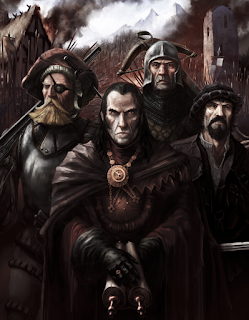The Case for OSR: Part 2
Mom says it's our turn to roll death saves
- art by Jussi Alarauhio -
My introduction to the OSR happened at the bookstore. Browsing the TTRPG aisle, a heavy tome caught my eye with its name and artwork alone: Zweihander. Touting itself as both grim and perilous, the idea of a more dangerous system than D&D thrilled me. I bought it, and spent the next week or so reading it cover to cover. Zweihander is a d100 system, meaning everything is in percentiles, from core stats to the resulting skill checks. It also abandons traditional hit points in favor of Peril; basically the more you fail at fending off threats to your life, the closer you draw to death, in steps, until it is inevitable. What struck me as interesting was how mundane things like a rat bite or a crossbow bolt wound could kill a character. Nobody playing Zweihander is going out in a blaze of glory like Matthew McConaughey in Reign of Fire. It's much more likely they will suffer an ignominious death like Robert Baratheon in Game of Thrones. Through Zweihander I glimpsed but one facet of the OSR, and it was beautiful.
I should probably explain what OSR stands for at this point. OSR can mean Old School Roleplaying, Old School Renaissance, Old School Revival, Old School Reference, and probably some other things I haven't considered. The acronym itself encompasses all possible definitions at once, and always is used to refer to the community of TTRPG players who seek to recapture the magic of earlier editions of beloved RPG franchises. These imitations of early editions are commonly referred to as retroclones or hacks, depending on the method of construction. Zweihander itself is a hack of early editions of the Warhammer Fantasy RPG, cutting and pasting the best aspects of those systems to create something familiar, but new. Knowing this, I longed to experience D&D in its earliest stages.
While not technically the first iteration of D&D, Advanced Dungeons & Dragons was published as "1st Edition". It had compiled all the rulings and appendices that had previously been tacked on to the early D&D Basic/Expert boxes into a single set of meshed rules. I decided 1E was what I wanted to learn, and quickly set about acquiring the proper PDFs to print my own Player's Handbook, Dungeon Master's Guide, and Monster Manual. I was simultaneously charmed and annoyed with Gary Gygax's flowery, inefficient prose, and found myself going over all three books with a highlighter to mark anything resembling an actual rule to help myself get a sense of how this game was supposed to be played. I craved a condensed book with straightforward mechanics and tables, rather than paragraphs explaining why there needed to be rules in a fantasy role-playing game. I suppose my perspective was a little narrow. After all, these books were published in a time when TTRPGs were a brand-new concept. Even so, I scoured the internet for actual-play videos of AD&D 1E (spoilers, there aren't many) and tutorials so I could see the rules in action. I listened to the Roll for Initiative podcast religiously. I clumsily ran a one-shot to get some hands-on experience with the system. The system felt clumsy and difficult to run, but I couldn't shake the feeling that it was because I was doing something wrong. In my desperation to make 1E work and finally have my truly old-school gaming experience, I searched for anyone in the vast sea of the interwebs that had bothered to simplify the mechanics of 1E to a readable, playable format. I stumbled upon OSRIC, and consequently the OSR community.
OSRIC stands for Old-School Reference and Index Compilation, and is exactly what every modern 1E player needs: a boiled-down set of rules and tables for Advanced Dungeons & Dragons. It's beautifully succinct, resolves contradictions present in Gygax's original publications, and is organized to better suit quick referencing during gameplay for both DMs and players. OSRIC is a faithful retroclone, which seeks to recreate the gaming experience of 1st Edition as closely as possible while eliminating the confusion and chaos that reigned in the early days of TTRPGs. Behind OSRIC stands an entire community of gamers hacking and retrocloning furiously to provide each other with the content that scratches the old-school itch. By nature, these systems have several features in common that have come to define the OSR:
1. Lethality - While it's true in most OSR systems that each character's hit points increase with leveling, it's also difficult to regain hit points lost collaterally while adventuring. Potions of healing are uncommon, as they are unavailable for purchase and therefore must be found or created by the PCs. A meager amount of hit points can be regained naturally each day, provided the PCs had a full night's rest. These conditions bring a certain mortality to the table that is notably absent in later editions. Characters who survive the early levels of gameplay to become famous heroes do so with caution and wits.
2. Inventory management - The complexity of inventory varies greatly from one system to another, the simpler granting each character a number of slots based on their Strength score, the more complex requiring weight totals under a certain max value, affecting movement speed as items and treasure accumulate. To handwave the concept entirely is to abandon a core mechanic of the game: recovery of treasure. PCs can only carry so much out of the dungeon on their backs, necessitating the use of carts, pack animals, and hirelings for the extraction of larger hoards. Which brings us to the next feature...
3. Henchmen/Hirelings - These terms are sometimes used interchangeably, but in 1st edition, hirelings are commoners with no combat skills, but specific trade skills that will contract with the party to aid them in their adventures. Henchmen, on the other hand, are adventurers like the PCs who will join them as they gain renown in their adventures, hoping to gain a share of fame and fortune. The purpose of these NPC employees is twofold: filling in the gaps in the party skillset, including the bearing of gilded burdens, and acting as replacements for core PCs who are killed in action.
4. Static Leveling - The stats you roll for your character at the beginning do not increase with your level. Rare magical tomes or powerful spells may raise them incrementally, but don't count on it. Leveling represents the accruement of renown and wealth, and to a certain degree combat expertise.
There are, of course, exceptions to all of these mechanics, depending on which of the myriad retroclones and hacks you decide to play with. And the list could be longer, but I've decided to reserve some finer points of OSR philosophy for deeper explanation in a later article. From a mechanical standpoint, though, the above four features are typically baked into the system. Any 5E player may look at these and say, "Nothing prevents me from tacking these on to my own game, so why go back?" The answer is that a TTRPG system built around these core mechanics has a fundamentally different focus than one where they are simply grafted on as an afterthought. For example, 5E's high-fantasy, low-lethality gameplay could be altered, either by restricting HP recovery or inflating monster difficulty, but doing so openly defies the expectations the publishers have set forth for the players.
If you expect a quantifiable difference in player satisfaction between 5E and the OSR, you won't find one. Every table is different, and each person's gaming experience is highly subjective. But there is a certain je ne sais quoi to be found in OSR play, and no amount of pleading on my part will help you experience it for yourself. The best course is to grab the system that appeals to you most and jump in. The dice will do the rest.




"Advanced Dungeons & Dragons was published as "1st Edition". It had compiled all the rulings and appendices that had previously been tacked on to the early D&D Basic/Expert boxes into a single set of meshed rules"
ReplyDeleteWorth noting that AD&D 1e actually predated B/X. Holmes Basic came out in 1977 and was explicitly incomplete as it was intended to lead into AD&D 1e, which released between '77-79. Basic/Expert released in 1981 after AD&D had already been out for a few years, and marked the true beginning of the Basic D&D line as its own distinct thing.
Aaaah I've been conditioned to refer to Holmes as B/X. Good catch!
Delete